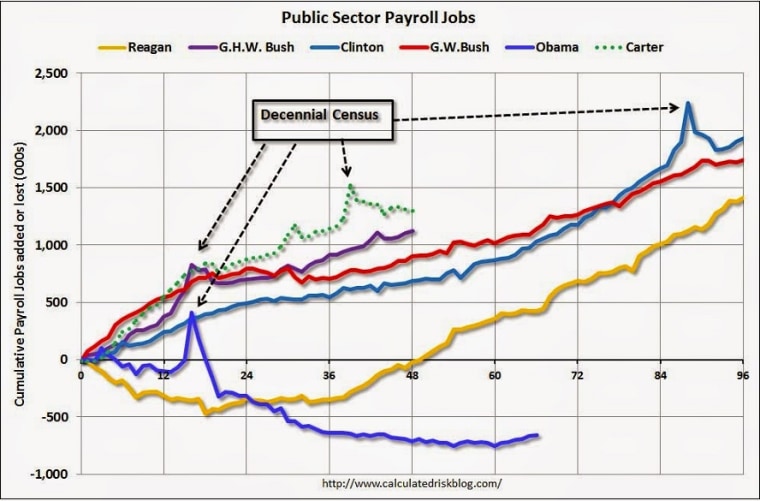It's tempting to publish this chart literally every day, in the hopes that eventually the political world would come to understand, but that would probably get annoying. That said, the fact that Bill McBride graciously updated Calculated Risk's previous work on the subject is a convenient excuse to revisit the subject.

Broadly speaking, job growth in the United States can be divided into two general categories: private-sector jobs (created by businesses) and public-sector jobs (created by federal, state, and local governments).
When there's a recession, government officials do what they can to spur private hiring, but public-sector jobs are the one area of the employment landscape officials have direct control over. And before the Great Recession, policymakers in both parties agreed it was sensible not to lay off public-sector workers.
Indeed, it was just common sense -- kicking Americans out of their jobs, on purpose, during an economic downturn, will only make unemployment worse.
But after President Obama took office, the rules changed. Republicans insisted, repeatedly and out loud, that the economy would improve if policymakers agreed to shrink government -- and that meant getting rid of public-sector workers like teachers, police officers, firefighters, etc.
In one of the most important quotes that no one remembers anymore, newly elected House Speaker John Boehner (R-Ohio) told reporters about the public sector in February 2011, "If some of those jobs are lost, so be it."
The unemployment rate was 9% at the time, and most Americans considered the status quo a jobs crisis. But for the nation's most powerful Republican elected lawmaker, if GOP policies deliberately forced more public-sector workers onto the unemployment line, "so be it." In other words, he just didn't care -- putting more Americans out of work was fine, in the Speaker's mind, just so long as they came from the part of the economy he and his party didn't like.
And generally speaking, that's what happened. Obama proposed protecting public-sector jobs through his American Jobs Act, but congressional Republicans quickly destroyed his proposal, and as the nation struggled to recover from the effects of the Great Recession, public-sector workers continued to face layoff -- on purpose, because GOP lawmakers said so.
I was about to write that it's like fighting the recession with one arm tied behind your back, but that's not quite right. It's more accurate to say it's like fighting the recession with one arm, while repeatedly punching yourself in the face with the other arm.
Ask a typical Republican member of Congress about economic policy in the Obama era, and most of them will follow Boehner's lead and ask, "Where are the jobs?" What they won't say, and may not fully understand, is that the unemployment rate would be about 5% right now if Obama were allowed to maintain public-sector job growth at the same pace as Reagan did.
This is the most-important-but-well-kept secret in the economic debate: the unemployment rate has been inflated by a misguided economic theory that required the government to lay off workers during an economic downturn.
To this day, Republicans will continue to push the fiction that the government has exploded in size in the Obama era, but in reality, the number of federal, state, and local employees has shrunk since the president took office -- despite the fact that we desperately needed the opposite.
This isn't evidence of the Obama economic agenda failing; it's largely evidence of the opposite.
Keep this in mind the next time your crazy uncle who watches Fox News all day sends an all-caps email, complaining that this is the weakest of all modern recoveries, feel free to tell him, "Yes, and it'd be a lot stronger if Republicans didn't try to make things 'better' by laying off more workers on purpose."
When we make lists of all the ways in which the normal rules changed under the Obama administration, let's not leave this off. This is the first time in modern history the United States tried to make unemployment better while also deliberately making unemployment worse.